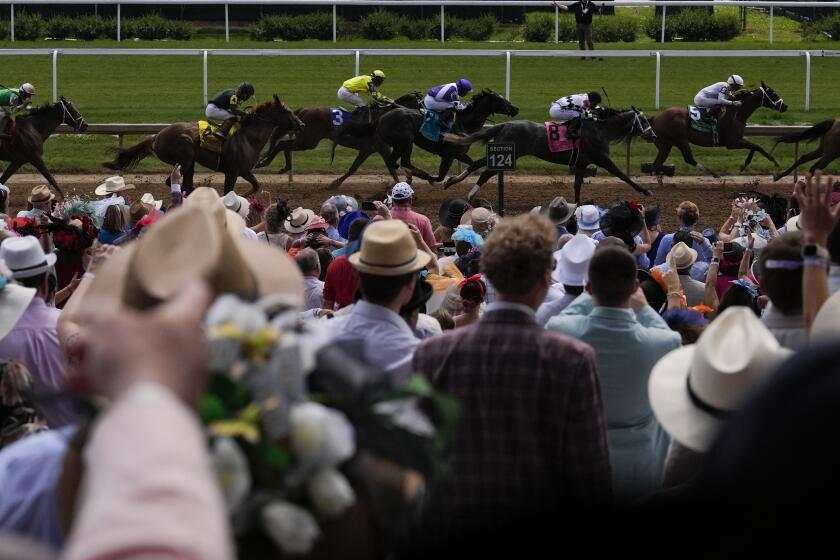Marlins About to Lose the Big Fish
- Share via
Florida Marlins owner Wayne Huizenga sustained baseball’s salary spiral almost single-handedly last winter. Now, he wants out of the sport because the price of doing business has gotten too high.
Huizenga, who committed $175 million to improve the club during the off-season, announced that he is putting the franchise up for sale because of staggering losses that could total $30 million for the 1997 season.
This cannot come as good news to his fellow owners, who also paid a heavy price for Huizenga’s ill-advised spending spree. The big contracts given to Gary Sheffield, Alex Fernandez, Bobby Bonilla and Moises Alou -- combined with a similar spending spree by Chicago White Sox Owner Jerry Reinsdorf -- sent salaries soaring just as Major League Baseball was coming to an agreement with the players union on a taxation plan aimed at holding payrolls in check.
“It’s a tough decision to make for us,” Huizenga said Thursday. “We have lost money every year. The simple answer is, we are not willing to sustain the losses.”
No offers have been made public, but Financial World magazine estimated that the franchise is worth $123 million, well below the record $174 million that Peter Angelos and a group of partners paid at auction for the Baltimore Orioles in 1993 and far below the estimated $350 million that Ruppert Murdoch apparently will pay for the Los Angeles Dodgers franchise. Huizenga paid a $95 million expansion fee and $20 million in start-up costs to launch the team in 1993.
Though the Marlins’ average attendance (29,525) ranks in the top third of major-league teams, a 35 percent increase in home attendance was not enough to off-set a nearly 100 percent increase in the size of the club’s payroll, which at $47.7 million is the fifth highest in the game.
“When I heard that number (the payroll increase) I thought they would have trouble,” Angelos said. “You’re simply not going to get that kind of increase in attendance in that short a time.”
Huizenga’s miscalculation may cost his fellow owners millions in higher salaries over the next few years because of the impact his spending had on the free-agent market, which could lead to the perception that he is running away from the economic mess he created.
“That might be too harsh,” Angelos said. “They were trying to affect something dramatic to increase the fan appeal of the ballclub. That didn’t work the way they hoped. That payroll is going to have a negative effect on the value of the team. I think that they made a good-faith effort, but business deals can have unfortunate consequences. It might be something that sends a message to all the owners.
“We did that when we come on here, be we were dealing with a club that was selling out every game. We went from I think $28 million to $36 million. That was a substantial move, but well within the financial potential of the operation.”
The Marlins’ roster reconstruction had the desired effect on the field. The four-year-old club was transformed into a strong National League contender. Its 45-30 record is the third-best in baseball behind the Orioles and the NL East leading Atlanta Braves. If the regular season were to end today, the Marlins would be making their first appearance in the postseason as the National League wild-card entry.
“We have a good shot at winning the division, which means we have to catch the Braves,” Huizenga said at a news conference Thursday. “And if we don’t do that, we have a good shot at winning a playoff spot. We are enthusiastic about the team. It is the best year we’ve ever had. We are not going to ruin this season by cutting back on the team.”
Attendance was strong during the club’s inaugural season, when the Marlins drew an average of 37,838 fans per game, but that average had slipped to 21,565 last year. So Huizenga authorized his front office to spend whatever was necessary to turn the club into an instant contender.
“The team has been performing well on the field,” he said. “In fact, we’re playing .600 ball and we have (one of) the best records in major-league baseball. But the fact is that over the past five years, we have lost a lot of money. As of now, we have over $200 million invested in the team. We are not willing to sustain the losses any further.”
Huizenga indicated that he intends to sell the team to someone who will keep it in South Florida, but his inability to sell the area on a new baseball stadium and lingering disappointment over the state legislature’s refusal to grant him a $60 million tax break to make Pro Player Stadium more suitable for baseball also are believed to have contributed to his decision to sell the franchise.
“We believe the team is going to stay in Florida. We want to keep it in South Florida,” he said. “We brought it here. It makes a big difference to our fans, to our season-ticket holders, to our sponsors, to our employees. We will do everything possible to keep the team here in South Florida.”
More to Read
Go beyond the scoreboard
Get the latest on L.A.'s teams in the daily Sports Report newsletter.
You may occasionally receive promotional content from the Los Angeles Times.










